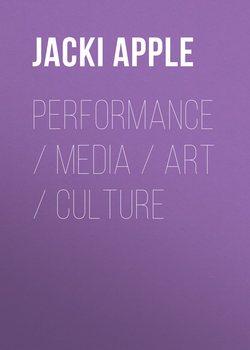Читать книгу Performance / Media / Art / Culture - Jacki Apple - Страница 17
На сайте Литреса книга снята с продажи.
Bleeder
ОглавлениеNowhere is this more evident than in Bleeder. Allen understands not only the power of radio as a storytelling medium but the capacity of sound and the sound of language to conjure up vivid images that are as essential to the central narrative as the progression of the story told through the characters. In Bleeder the recollections of one woman recounted in a distinctly Texan vernacular accompanied by a prairie wind, hymns, and songs evoking the 50s and 60s paint a vivid portrait of a piece of America through the fictional biography of one man. In this instance the central character to which the title refers is a hemophiliac who hates Dracula movies, “maybe because he spent his whole life living off other people’s blood.” He was a huckster, a politician, a possible gangster, a charlatan, a religious fanatic, a drunk, and a great storyteller, born of oil and married into cattle, and the “only person I ever knew who had no conscience whatsoever.”
Like all of Allen’s titles “bleeder” functions as a metaphor that encompasses far more than its original reference. This work is a parable of America letting blood, America in the era of assassinations and Vietnam, America then and now. The telling of the story is an act of recollection, and a revision of history. Welcome to Lyndon Johnson’s Texas of backroom politics and big deals, cattlemen and oilmen, and women with big appetites and big hair, men with big hands, big talk, and big cars. This is also the Texas of revivalist preachers and TV evangelists, of hustlers and gamblers, whiskey and guns, cash through Christ, the Kennedys on the cross, blood money, faith betrayed. Allen makes every lie reveal a deeper truth as he examines the way history, events, images, memory, and hallucination dissolve into each other, become reworked and mythologized.
The Bleeder’s life story is told by a woman who knew him. “He’s really runnin’ through my heart tonight.” This eulogy embraces all the dichotomies and contradictions, equalizes all the shadings of good and bad, and transforms him into a cultural icon. For every act of redemption there are dirty sheets.
… We’d get really drunk, an tell dirty jokes, really filthy … we’d all be laughin’ our asses off rollin’ around howlin’ on the floor and all of a sudden he’d just stop … sit at the piano and stare at the keys … he’d start playin’ an singin’ real soft some wonderful sad beautiful gospel song (pause) like the devil had just hopped right outta his mouth and a sweet angel had stepped in …. He had a special thing in his heart for Jesus. I think it was that blood ….
The violence is in his body, a stomach full of whiskey and blood and Jesus. Guns, and pills for the pain, and stacks of bills in a suitcase. The Bleeder’s biography is also America’s biography. We make our own myths. History and memory bleed into each other. Paradox and nostalgia. Auld Lang Syne, and a country western song. Sex and death and resurrection. He had said “biography is form of necrophilia… blood could fly outta him like a dam breaking.” God bless America. Amen.
